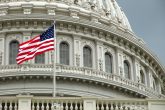August 12, 2020
The Death and Rebirth of American Internationalism
For the first three years of Donald Trump’s presidency, U.S. foreign policy hovered in suspended animation. Trump wreaked plenty of havoc: disparaging allies, issuing tariffs as if they were tweets, and exiting international compacts willy-nilly. But many in the U.S. foreign policy establishment held out hope that these perversions would be like a bad dream—an unsettling interval after which things could return to normal, not a decisive break in America’s approach to the world.
The time has come for Americans to rethink their country’s role in the world and fashion an internationalism suited to today’s realities.
This hope was not without justification. While the implementation of U.S. foreign policy has fluctuated widely across administrations, the overarching aims have remained remarkably stable since the end of the Cold War. From George H. W. Bush’s “new world order” to Bill Clinton’s “democratic enlargement,” George W. Bush’s “freedom agenda” to Barack Obama’s “rules-based international order,” the goal has been to extend the reach of democracy and free markets around the globe. During the Cold War, the United States and its allies built one international order, and the Soviet Union built another. For the past thirty years, the United States has sought to universalize the order that survived the fall of the Berlin Wall—a project we can call liberal universalism. Its objective—expanding an order that already existed—explains why there has been little innovation in international organizations since the end of the Cold War, whereas Washington has labored to increase membership in institutions that predate 1989.
Read the full article in the Boston Review.
More from CNAS
-
America Must Promote Democracy, Despite Trump’s Disdain for It
A dysfunctional U.S. democracy at home makes it less credible to support liberalism abroad....
By Richard Fontaine
-
Sharper: The Next Congress
When the 117th Congress is sworn in next January, legislators have the opportunity to exert substantial influence on the future of America's role in the world....
By Katie Galgano, Chris Estep & Cole Stevens
-
Republicans Can Learn From Democrats’ Foreign Affairs Committee Contest
Republican legislators in both the House and the Senate have ample time to draw lessons from Engel’s loss and translate them into reform....
By Chris Estep
-
The United States Can’t Afford to Turn Away Chinese Talent
Intellectual property theft is a real concern, and China has been the world’s foremost infringer. But a blanket exclusion of Chinese students from U.S. academic and scien...
By Elsa B. Kania & Lindsay Gorman




